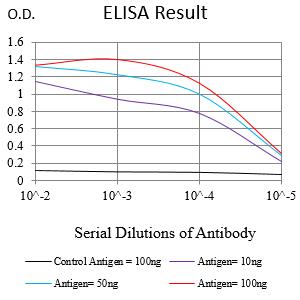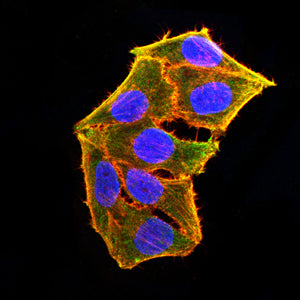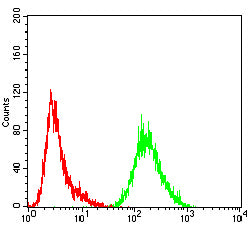


| WB | 咨询技术 | Human,Mouse,Rat |
| IF | 咨询技术 | Human,Mouse,Rat |
| IHC | 咨询技术 | Human,Mouse,Rat |
| ICC | 1/50 - 1/200 | Human,Mouse,Rat |
| FCM | 1/200 - 1/400 | Human,Mouse,Rat |
| Elisa | 1/10000 | Human,Mouse,Rat |
| Aliases | PARK8; RIPK7; ROCO2; AURA17; DARDARIN |
| Entrez GeneID | 120892 |
| clone | 2A2A8 |
| WB Predicted band size | 286kDa |
| Host/Isotype | Mouse IgG1 |
| Antibody Type | Primary antibody |
| Storage | Store at 4°C short term. Aliquot and store at -20°C long term. Avoid freeze/thaw cycles. |
| Species Reactivity | Human |
| Immunogen | Purified recombinant fragment of human LRRK2 (AA: 300-530) expressed in E. Coli. |
| Formulation | Purified antibody in PBS with 0.05% sodium azide |
+ +
以下是3-4篇关于LRRK2抗体的参考文献(示例基于领域内典型研究,部分信息可能需核实):
1. **"Comprehensive characterization of LRRK2 antibodies reveals limited specificity for neuropathological studies"**
- **作者**: James, S. R. et al.
- **摘要**: 评估了多种商业LRRK2抗体的特异性,发现部分抗体存在交叉反应性,强调验证抗体在特定实验模型中的必要性。
2. **"Phosphorylation of LRRK2 in Parkinson's disease: Insights from antibody-based assays"**
- **作者**: Rudenko, I. N. & Cookson, M. R.
- **摘要**: 分析了针对LRRK2磷酸化位点(如Ser910/Ser935)的抗体在疾病模型中的表现,探讨其在病理机制研究中的应用与局限性。
3. **"Comparative analysis of LRRK2 antibodies in human and rodent brain tissues"**
- **作者**: Davies, P. et al.
- **摘要**: 比较不同抗体在人和啮齿类动物脑组织中的检测效率,提出优化抗体选择以提高LRRK2蛋白定位的准确性。
4. **"LRRK2 as a biomarker in Parkinson's disease: Validation of antibody-based detection methods"**
- **作者**: Kalia, L. V. et al.
- **摘要**: 验证了特异性LRRK2抗体在体液(脑脊液、血液)中的检测能力,探讨其作为帕金森病生物标志物的潜力。
(注:以上为示例性内容,实际文献需通过PubMed或Google Scholar检索关键词“LRRK2 antibody validation/specificity/application”获取。)
×